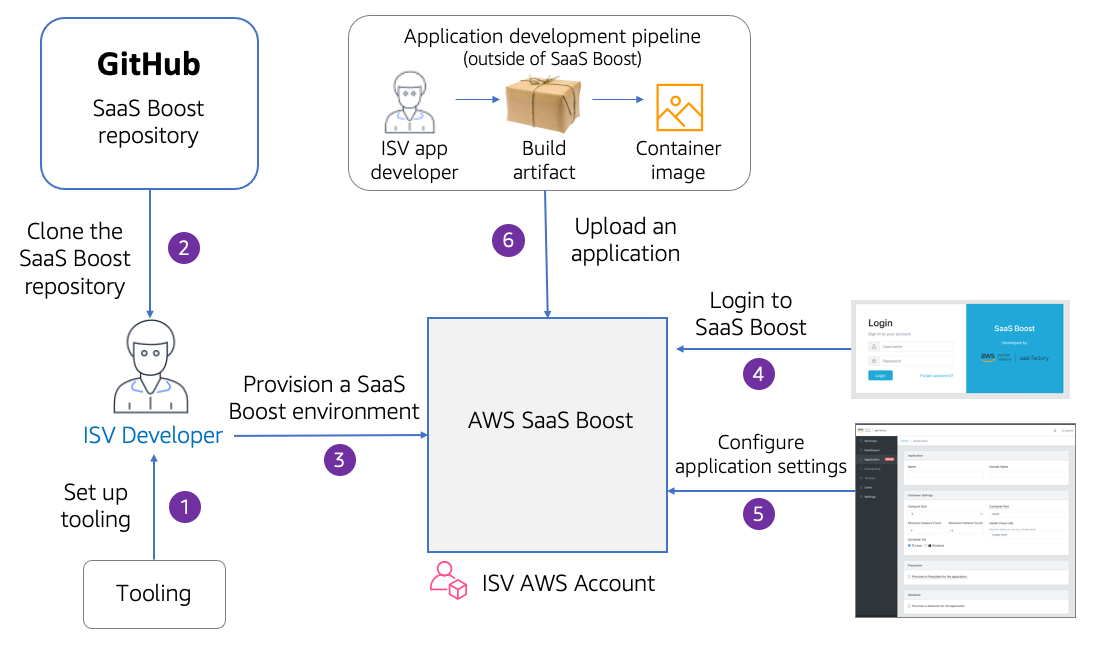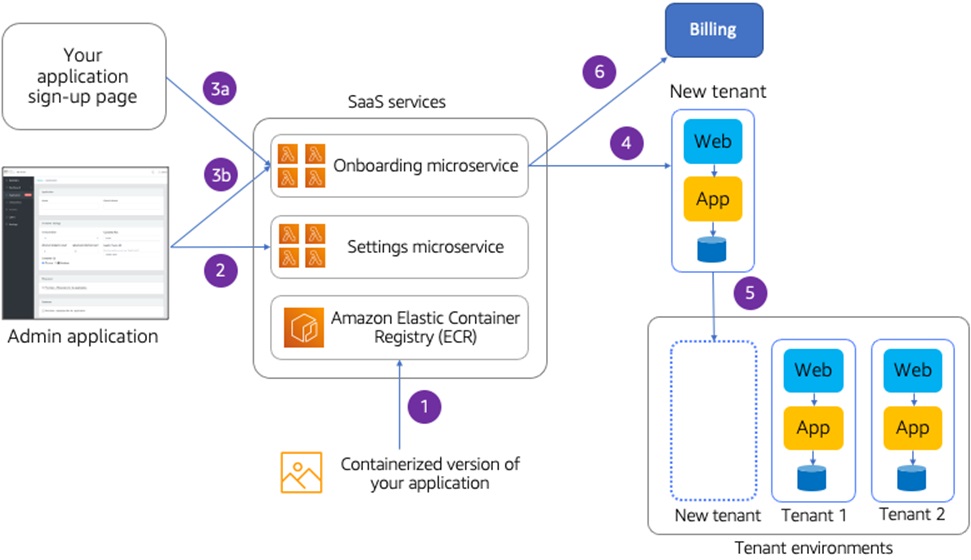728x90
SaaS Boost 배포 과정 설명

1,2,3) SaaSBoost 환경을 프로비저닝 한다.
https://github.com/awslabs/aws-saas-boost
4) 프로비저닝된 SaaSBoost 환경에 로그인 한다.
5) 앞으로 배포하게될 어플리케이션을 등록한다.
6) ECR레지스트리에 Image Build된 해당 어플리케이션을 Push 한다
7) 테넌트에 배포한다.
SaaSBoost 콘솔

SaaSBoost 콘솔 아키텍처


Git소스코드를 보면 SaaSBoost의 모든 어플리케이션은 Lambda에서 돌아간다... 콘솔뿐만 아니라 다양한 도메인을 Lambda로 구성해서 운영하고 있다. 도메인은 Onboarding, Metrics, User, Settings, Tenant, Quata가 있다.

Billing 도메인 중 lambda 하나를 예로 들자면 AWS Lambda Core의 RequestStreamHandler(비동기전용) 로 필요한 API를 구현하였다.
public class BillingEventAggregation implements RequestStreamHandler {
private final DynamoDbClient ddb;
private final Logger LOGGER = LoggerFactory.getLogger(BillingEventAggregation.class);
private final static String TABLE_NAME = System.getenv(TABLE_ENV_VARIABLE);
public BillingEventAggregation() {
long startTimeMillis = System.currentTimeMillis();
if (Utils.isBlank(TABLE_NAME)) {
throw new IllegalStateException("Missing required environment variable " + TABLE_ENV_VARIABLE);
}
// Used by TenantConfiguration
if (Utils.isBlank(System.getenv("DYNAMODB_CONFIG_INDEX_NAME"))) {
throw new IllegalStateException("Missing required environment variable DYNAMODB_CONFIG_INDEX_NAME");
}
LOGGER.info("Version Info: " + Utils.version(this.getClass()));
ddb = Utils.sdkClient(DynamoDbClient.builder(), DynamoDbClient.SERVICE_NAME);
LOGGER.info("Constructor init: {}", System.currentTimeMillis() - startTimeMillis);
}
private List<BillingEvent> getBillingEventsForTenant(String tenantID) {
HashMap<String,String> expressionNames = new HashMap<>();
expressionNames.put(PRIMARY_KEY_EXPRESSION_NAME, PRIMARY_KEY_NAME);
expressionNames.put(SORT_KEY_EXPRESSION_NAME, SORT_KEY_NAME);
HashMap<String,AttributeValue> queryValues = new HashMap<>();
AttributeValue tenantIDValue = AttributeValue.builder()
.s(tenantID)
.build();
AttributeValue eventPrefixValue = AttributeValue.builder()
.s(EVENT_PREFIX)
.build();
queryValues.put(TENANT_ID_EXPRESSION_VALUE, tenantIDValue);
queryValues.put(EVENT_PREFIX_ATTRIBUTE_VALUE, eventPrefixValue);
QueryResponse result = null;
List<BillingEvent> billingEvents = new ArrayList<>();
do {
QueryRequest request = QueryRequest.builder()
.tableName(TABLE_NAME)
.keyConditionExpression(String.format("%s = %s and begins_with(%s, %s)",
PRIMARY_KEY_EXPRESSION_NAME,
TENANT_ID_EXPRESSION_VALUE,
SORT_KEY_EXPRESSION_NAME,
EVENT_PREFIX_ATTRIBUTE_VALUE))
.expressionAttributeNames(expressionNames)
.expressionAttributeValues(queryValues)
.build();
if (result != null && !result.lastEvaluatedKey().isEmpty()) {
request = request.toBuilder()
.exclusiveStartKey(result.lastEvaluatedKey())
.build();
}
try {
result = this.ddb.query(request);
} catch (ResourceNotFoundException e) {
this.LOGGER.error("Table {} does not exist", TABLE_NAME);
} catch (InternalServerErrorException e) {
this.LOGGER.error(e.getMessage());
// if there's a failure, return an empty array list rather than a partial array list
return new ArrayList<>();
}
for (Map<String, AttributeValue> item : result.items()) {
String eventEntry = item.get(SORT_KEY_NAME).s();
Long eventTimeInMilliseconds = Long.valueOf(eventEntry.split(ATTRIBUTE_DELIMITER)[EVENT_TIME_ARRAY_INDEX]);
String nonce = eventEntry.split(ATTRIBUTE_DELIMITER)[NONCE_ARRAY_INDEX];
Instant eventTime = Instant.ofEpochMilli(eventTimeInMilliseconds);
String productCode = item.get(PRODUCT_CODE_ATTRIBUTE_NAME).s();
Long quantity = Long.valueOf(item.get(QUANTITY_ATTRIBUTE_NAME).n());
BillingEvent billingEvent = new BillingEvent(tenantID, eventTime, productCode, quantity, nonce);
billingEvents.add(billingEvent);
}
} while (!result.lastEvaluatedKey().isEmpty());
return billingEvents;
}
private Map<ZonedDateTime, List<BillingEvent>> categorizeEvents(TenantConfiguration tenant, List<BillingEvent> billingEvents) {
if (billingEvents.size() == 0) {
return null;
}
// Figure out the lowest and highest date (the range)
Instant earliestBillingEvent = Collections.min(billingEvents).getEventTime();
this.LOGGER.info("Earliest event for tenant {} at {}",
tenant.getTenantID(),
earliestBillingEvent.toString());
Instant latestBillingEvent = Collections.max(billingEvents).getEventTime();
this.LOGGER.info("Latest event for tenant {} at {}",
tenant.getTenantID(),
latestBillingEvent.toString());
// Create a map with each element as a key based on the frequency (e.g. a day for a key with frequency for a day)
Map<ZonedDateTime, List<BillingEvent>> eventCounts = new HashMap<>();
for (BillingEvent event : billingEvents) {
ZonedDateTime eventTime = event.getEventTime().atZone(ZoneId.of("UTC"));
ZonedDateTime startOfEventTimePeriod = eventTime.truncatedTo(TRUNCATION_UNIT);
ZonedDateTime startOfCurrentTimePeriod = Instant.now().atZone(ZoneId.of("UTC")).truncatedTo(TRUNCATION_UNIT);
// Skip over this time period and future time period events because there may eventually be more events
if (!(startOfCurrentTimePeriod.compareTo(startOfEventTimePeriod) <= 0)) {
List<BillingEvent> eventList = eventCounts.getOrDefault(startOfEventTimePeriod, new ArrayList<>());
eventList.add(event);
eventCounts.put(startOfEventTimePeriod, eventList);
}
}
return eventCounts;
}
private void initializeItem(Map<String, AttributeValue> compositeKey, String productCode, ZonedDateTime time) {
// Format the statements
Map<String, AttributeValue> productToValueMap = new HashMap<>();
AttributeValue initialEventValue = AttributeValue.builder()
.n(EVENT_COUNT_INITIALIZATION_VALUE)
.build();
productToValueMap.put(productCode, initialEventValue);
AttributeValue initialMapValue = AttributeValue.builder()
.m(productToValueMap)
.build();
compositeKey.put(QUANTITY_ATTRIBUTE_NAME, initialMapValue);
AttributeValue idempotencyKeyValue = AttributeValue.builder()
.s(UUID.randomUUID().toString().split(UUID_DELIMITER)[SELECTED_UUID_INDEX])
.build();
compositeKey.put(IDEMPOTENTCY_KEY_ATTRIBUTE_NAME, idempotencyKeyValue);
AttributeValue submittedValue = AttributeValue.builder()
.bool(false)
.build();
compositeKey.put(SUBMITTED_KEY_ATTRIBUTE_NAME, submittedValue);
String conditionalStatement = String.format("attribute_not_exists(%s)", QUANTITY_ATTRIBUTE_NAME);
PutItemRequest putItemRequest = PutItemRequest.builder()
.tableName(TABLE_NAME)
.item(compositeKey)
.conditionExpression(conditionalStatement)
.build();
try {
ddb.putItem(putItemRequest);
} catch (ResourceNotFoundException|InternalServerErrorException e) {
this.LOGGER.error("{}", e.toString());
} catch (ConditionalCheckFailedException e) {
// Repeat the transaction and see if it works
this.LOGGER.error("Entry for {} at {} already exists",
productCode,
time.toInstant().toString());
}
}
private void putRequestsAsTransaction(Update updateRequest, List<Delete> deleteRequests) {
List<TransactWriteItem> transaction = new ArrayList<>();
TransactWriteItem updateTransactionItem = TransactWriteItem.builder()
.update(updateRequest)
.build();
transaction.add(updateTransactionItem);
List<TransactWriteItem> deleteRequestItems = deleteRequests.stream().map(deleteRequest -> TransactWriteItem.builder()
.delete(deleteRequest)
.build()).collect(Collectors.toList());
transaction.addAll(deleteRequestItems);
this.LOGGER.info("Transaction contains {} actions", transaction.size());
TransactWriteItemsRequest transactWriteItemsRequest = TransactWriteItemsRequest.builder()
.transactItems(transaction)
.build();
try {
ddb.transactWriteItems(transactWriteItemsRequest);
} catch (ResourceNotFoundException|InternalServerErrorException|TransactionCanceledException e) {
this.LOGGER.error("{}", e.toString());
}
}
private Map<String, Long> countEventsByProductCode(List<BillingEvent> billingEvents) {
Map<String, Long> countByProductCode = new HashMap<>();
this.LOGGER.info("Counting events by product code");
for (BillingEvent event : billingEvents) {
Long currentCount = countByProductCode.getOrDefault(event.getProductCode(), Long.valueOf(0));
Long updatedCount = event.getQuantity() + currentCount;
countByProductCode.put(event.getProductCode(), updatedCount);
}
// There's now a map in the format of
// product-code : count
return countByProductCode;
}
private Update buildUpdate(Map<String,Long> countByProductCode, Map<String, AttributeValue> compositeKey) {
List<String> updateStatements = new ArrayList<>();
Map<String, String> expressionAttributeNames = new HashMap<>();
expressionAttributeNames.put(QUANTITY_EXPRESSION_NAME, QUANTITY_ATTRIBUTE_NAME);
Map<String, AttributeValue> expressionAttributeValues = new HashMap<>();
Integer index = 0;
for (String productCode : countByProductCode.keySet()) {
this.LOGGER.info("Count for {} is {}", productCode, countByProductCode.get(productCode));
// Appended to the ADD_TO_AGGREGATION_ATTRIBUTE_VALUE for identification in the expression
// attribute names/values. There could be more than one product code to aggregate
String aggregationAttributeName = ADD_TO_AGGREGATION_EXPRESSION_NAME + index.toString();
String aggregationAttributeValue = ADD_TO_AGGREGATION_EXPRESSION_VALUE + index.toString();
String updateStatement = String.format("SET %s.%s = %s.%s + %s",
QUANTITY_EXPRESSION_NAME,
aggregationAttributeName,
QUANTITY_EXPRESSION_NAME,
aggregationAttributeName,
aggregationAttributeValue);
updateStatements.add(updateStatement);
expressionAttributeNames.put(aggregationAttributeName, productCode);
AttributeValue countByProductionCodeValue = AttributeValue.builder()
.n(countByProductCode.get(productCode).toString())
.build();
expressionAttributeValues.put(aggregationAttributeValue, countByProductionCodeValue);
index++;
}
return Update.builder()
.tableName(TABLE_NAME)
.key(compositeKey)
.updateExpression(String.join(",", updateStatements))
.expressionAttributeNames(expressionAttributeNames)
.expressionAttributeValues(expressionAttributeValues)
.build();
}
private List<Delete> buildDeletes(List<BillingEvent> billingEvents, TenantConfiguration tenant) {
List<Delete> deleteRequests = new ArrayList<>();
for (BillingEvent event : billingEvents) {
Map<String, AttributeValue> keyToDelete = new HashMap<>();
Long eventTime = event.getEventTime().toEpochMilli();
String nonce = event.getNonce();
AttributeValue tenantIDValue = AttributeValue.builder()
.s(tenant.getTenantID())
.build();
keyToDelete.put(PRIMARY_KEY_NAME, tenantIDValue);
AttributeValue eventValue = AttributeValue.builder()
.s(String.format("%s%s%d%s%s",
EVENT_PREFIX,
ATTRIBUTE_DELIMITER,
eventTime,
ATTRIBUTE_DELIMITER,
nonce))
.build();
keyToDelete.put(SORT_KEY_NAME, eventValue);
Delete delete = Delete.builder()
.tableName(TABLE_NAME)
.key(keyToDelete)
.build();
deleteRequests.add(delete);
}
return deleteRequests;
}
private void performTransaction(List<BillingEvent> billingEvents, Map<String, AttributeValue> compositeKey, ZonedDateTime time, TenantConfiguration tenant) {
Map<String, Long> countByProductCode = new HashMap<>();
Update updateRequest = null;
List<Delete> deleteRequests = null;
countByProductCode = countEventsByProductCode(billingEvents);
this.LOGGER.info("Counting the quantity of entries for each product code");
// Initialize the item for this time slot if necessary
for (String productCode : countByProductCode.keySet()) {
this.LOGGER.debug("Initializing count for product code {} for tenant {} at time {}",
productCode,
tenant.getTenantID(),
time.toInstant().toString());
// TODO: This doesn't have to be done each time; keep track of what is already initialized
// Pass in a copy of compositeKey because initializeItem makes modifications to it
initializeItem(new HashMap<>(compositeKey), productCode, time);
}
this.LOGGER.debug("Batched {} events, performing transaction", billingEvents.size());
updateRequest = buildUpdate(countByProductCode, compositeKey);
deleteRequests = buildDeletes(billingEvents, tenant);
putRequestsAsTransaction(updateRequest, deleteRequests);
}
private void aggregateEntries(Map<ZonedDateTime, List<BillingEvent>> eventsByDate, TenantConfiguration tenant) {
Map<String, AttributeValue> compositeKey = new HashMap<>();
List<BillingEvent> eventsToCount = new ArrayList<>();
for (ZonedDateTime time : eventsByDate.keySet()) {
AttributeValue tenantIDValue = AttributeValue.builder()
.s(tenant.getTenantID())
.build();
compositeKey.put(PRIMARY_KEY_NAME, tenantIDValue);
AttributeValue aggregationEntryValue = AttributeValue.builder()
.s(formatAggregationEntry(time.toInstant().toEpochMilli()))
.build();
compositeKey.put(SORT_KEY_NAME, aggregationEntryValue);
List<BillingEvent> billingEvents = eventsByDate.get(time);
for (BillingEvent event : billingEvents) {
eventsToCount.add(event);
// 24 purges, 1 update
// Minus one because I need to leave room for the update statement
if (eventsToCount.size() == MAXIMUM_BATCH_SIZE - 1) {
performTransaction(eventsToCount, compositeKey, time, tenant);
eventsToCount.clear();
}
}
// Submit the last batch of items
// If the number of requests lands on an increment of 25, need to make sure that no attempt is made to put
// an empty list, which is why I'm checking for a size greater than zero
if (eventsToCount.size() > 0) {
performTransaction(eventsToCount, compositeKey, time, tenant);
eventsToCount.clear();
}
}
}
@Override
public void handleRequest(InputStream inputStream, OutputStream outputStream, Context context) {
this.LOGGER.info("Resolving tenant IDs in table {}", TABLE_NAME);
List<TenantConfiguration> tenants = TenantConfiguration.getTenantConfigurations(TABLE_NAME, this.ddb, this.LOGGER);
this.LOGGER.info("Resolved tenant IDs in table {}", TABLE_NAME);
if (tenants == null) {
this.LOGGER.info("No tenants found");
return;
}
for (TenantConfiguration tenant : tenants) {
List<BillingEvent> billingEvents = getBillingEventsForTenant(tenant.getTenantID());
if (billingEvents.isEmpty()) {
this.LOGGER.info("No events for {}", tenant.getTenantID());
continue;
}
// Count the number of events - this step is necessary to make the transactions work; they need
// to be grouped together
Map<ZonedDateTime, List<BillingEvent>> categorizedEvents = categorizeEvents(tenant, billingEvents);
if (categorizedEvents == null) {
this.LOGGER.info("No aggregation entries for {}", tenant.getTenantID());
} else {
// Put those results back into the table
aggregateEntries(categorizedEvents, tenant);
}
}
}
}
'Programming > MSA' 카테고리의 다른 글
| MicroService로 Netflix 비디오 처리 파이프라인 재구축 -1 (1) | 2024.02.12 |
|---|---|
| FaaS 구현을 위한 Open Source 프로젝트 OpenFaaS, Knative (0) | 2023.11.23 |
| 6. The Life Cycle of a Domain Object (0) | 2022.07.22 |
| Domain Driven Design/Eric Evance - 5. A Model Expressed in Software (0) | 2022.07.21 |
| Domain Driven Design/Eric Evance - 4. Isolating the Domain (0) | 2022.07.19 |